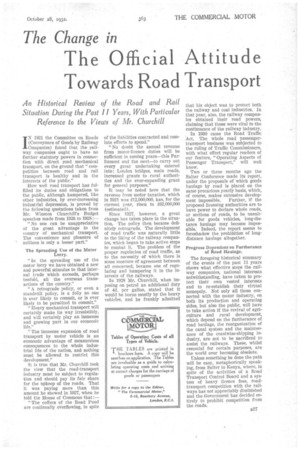The Change in
Page 53

If you've noticed an error in this article please click here to report it so we can fix it.
The Official Attitude Towards Road Transport
An Historical Review of the Road and Rail Situation During the Past 11 Years, With Particular Reference to the Views of Mr. Churchill
IN 1921 the Committee on Roads (Conveyance of Goods by Railway Companies) found that the railway companies ought to have no further statutory powers in connection with direct road mechanical transport, on the ground that "competition between road and rail transport is healthy and in the interests of the public."
How well road traneport has fulfilled its duties and obligations to the public, although hampered, like other industries, by ever-increasing industrial depression, is proved by the following quotations taken from Mr. Winston Churchill's Budget speeches made from 1926 to 1928:— " No one can be unappreciative of the great advantage to the country of mechanical transport. The convenience and pleasure of millions is only a lesser part."
The Spreading Use of the Motor Lorry.
"In the spreading use of the motor lorry we have obtained a new and powerful stimulus to that internal trade which exceeds, perhaps tenfold, all the overseas transactions of the country."
"A retrograde policy, or even a standstill policy, is a folly no one is ever likely to commit, or is ever likely to be permitted to commit."
"Heavy mechanical transport will certainly make its way irresistibly, and will certainly play an immense and growing part in our economic life."
"The immense expansion of road transport by motor vehicle is an economic advantage of measureless consequences to the whole industrial life of the nation, and nothing must be allowed to restrict this development."
It is true that Mr. Churchill took the view that the road-transport industry must be subject to regulation and should pay its fair share for the upkeep of the roads. That it was paying more than this amount he showed in 1927, when he told the House of Commons that :—
"The coffers of the Road Fund are continually overflowing, in spite of the liabilities contracted and resolute efforts to spend."
"No doubt the annual revenue from motor-licence duties will be sufficient in coming years—this Parliament and the next—to carry out every great undertaking entered into: London bridges, main roads, increased grants to rural authorities and the ever-expanding grant for general purposes."
It may be noted here that the revenue from motor taxation, which in 1921 was £12,000,000, has, for the current year, risen to £62,000,000 (estimated).
Since 1927, however, a great change has taken place in the situation. The policy then became definitely retrograde. The development of road traffic was naturally little to the liking of the railway companies, which began to take active steps to combat it. The problem of the proper regulation of road traffic, as to the necessity of which there is some measure of agreement between all concerned, became one of regulating and hampering it in the interests of the railways.
In 1928 Mr. Churchill, when imposing on petrol an additional duty of 4d. per gallon, stated that it would he borne mostly by the heavy vehicles, and be frankly admitted
that his object was to protect both the railway and coal industries. In that year, also, the railway companies obtained their road powers, claiming that these were vital to the continuance of the railway industry.
In 1930 came the Road Traffic Act. The whole road passengertransport business was subjected to the ruling of Traffic Commissioners, with what effect regular readers of our feature, "Operating Aspects of Passenger Transport," will well know.
Two or three months ago the Salter Conference made its report, under the proposals of which goods haulage by road is placed on the same precarious yearly basis, which, of course, makes extensive develop ment impossible. Further, if the proposed licensing authorities are to have power to declare whole roads, or sections of roads, to be unsuitable for goods vehicles, long-distance haulage may become impossible. Indeed, the report seems to foreshadow the prohibition of longdistance haulage altogether.
Progress Dependent on Furtherance of Road Haulage.
The foregoing historical summary of the events of the past 11 years shows what effective steps the railway companies, national interests notwithstanding, have taken to protect their own vested interests and to re-establish their virtual monopoly. Not only all those connected with the motor industry, on both its production and operating sides, but also the public, will have to take action if the revival of agriculture and rural development, which depend on the furtherance of road haulage, the reorganization of the canal system and the maintenance of the coastwise-shipping industry, are not to be sacrificed to assist the railways. These, whilst essential for certain purposes, are the world over becoming obsolete.
Unless something be done the path will be easy, metaphorically speaking, from Salter to Kenya, where, in spite of the activities of a Road Transport Control Board and a system of heavy licence fees, road transport competition with the railways has not appreciably diminished and the Government has decided entirely to prohibit competition from the roads.






































































































